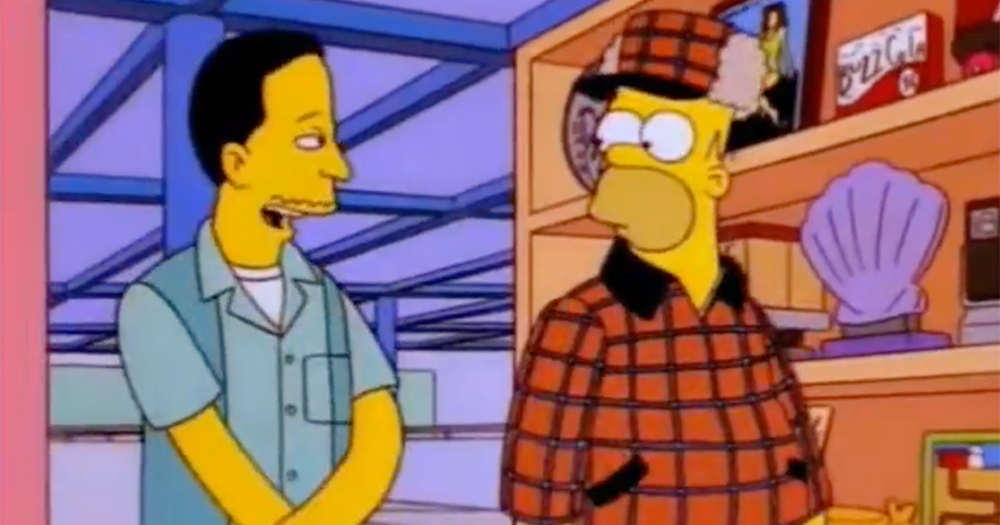I was reminded recently that it was the anniversary of the first-ever gay episode of The Simpsons, ‘Homer’s Phobia’ (Season 8, Episode 15, in case you want to revisit it) airing in America.
The plot involves Homer befriending a man named John, played by queer filmmaker, writer, actor and artist John Waters. Unbeknownst to Homer, John is a gay man, a fact that freaks him out.
Not admitting that he is homophobic, he rationalises his reaction by saying it wasn’t because John was gay, but because he was a sneak about it, stating, “I like my beer cold, my TV loud, and my homosexuals fuh-laming”. His paranoia leads to him suspecting that Bart might be gay, then embarking on a mission to “fix” him, which includes a hilarious scene in a gay steel mill.
An episode like this may not seem entirely significant now, but having John Waters as a guest star was a big deal in 1997. Before this, a Roseanne episode with a gay wedding was moved to a later start time, and Friends featured a gay wedding but without the ceremonial kiss. It was also a couple of months before Ellen DeGeneres came out publically on her sitcom.
The Simpsons had previously been coy about homosexuality. There were obvious references to Waylon Smithers and his unrequited love for Montgomery Burns. They also had queer actor Harvey Fierstein playing Homer’s stylish assistant back in 1990, but without any explicit reference to the character’s sexuality (it was definitely implied, as I remember picking up on it even as a kid).
However, they didn’t want to be coy with John Waters’ character or the episode. It is full of camp references, including the song ‘I Like The Nightlife’, which had famously been featured in Priscilla, Queen of the Desert, as well as the aforementioned gay steel mill that is full of obviously queer men who work hard but play hard too (my favourite scene).
This, however, led to the show having some problems with the censors. Usually, The Simpsons scripts would receive small censorship notes, but ‘Homer’s Phobia‘ resulted in three pages worth, and many of them were about things being gay or the very use of the word. The notes ended with the line, “The entire subject and content of this episode is unacceptable for air.”
Despite this, showrunners Bill Oakley and Josh Weinstein, both John Waters aficionados, decided to stick their necks out and proceed to production. Luckily, in the time it took to animate the episode, there was a change at the top of Fox and, presumably, the censor assigned to the show, as the response to the completed episode was “acceptable for broadcast”.
Nowadays, you see much more LGBTQ+ representation on The Simpsons – Smithers has come out, and Marge’s sister Patty has too, but I remember this episode as one of my favourites. I remember how it felt to see what I feel is positive representation.
I felt the show was laughing with gay people instead of at gay people. Indeed, Homer and his phobia are the butt of most of the jokes. GLAAD called it “a shining example of how to bring intelligent, fair and funny representations of our community onto television.”
I recently learned that the show’s staff asked John Waters if the gay community would find The Simpsons episode offensive. The only thing that bothered him was Homer’s use of the f-slur to insult John, so the writers changed it to “queer”.
Even John Waters underestimated the episode’s impact, as he began to be recognised on the street more often than before. He had instantly accepted the role, though, stating that if it was good enough for Elizabeth Taylor, it was good enough for him.
If you want to check out more of David Ferguson’s pop culture content, click here.
© 2023 GCN (Gay Community News). All rights reserved.
Support GCN
GCN is a free, vital resource for Ireland’s LGBTQ+ community since 1988.
GCN is a trading name of National LGBT Federation CLG, a registered charity - Charity Number: 20034580.
GCN relies on the generous support of the community and allies to sustain the crucial work that we do. Producing GCN is costly, and, in an industry which has been hugely impacted by rising costs, we need your support to help sustain and grow this vital resource.
Supporting GCN for as little as €1.99 per month will help us continue our work as Ireland’s free, independent LGBTQ+ media.

comments. Please sign in to comment.